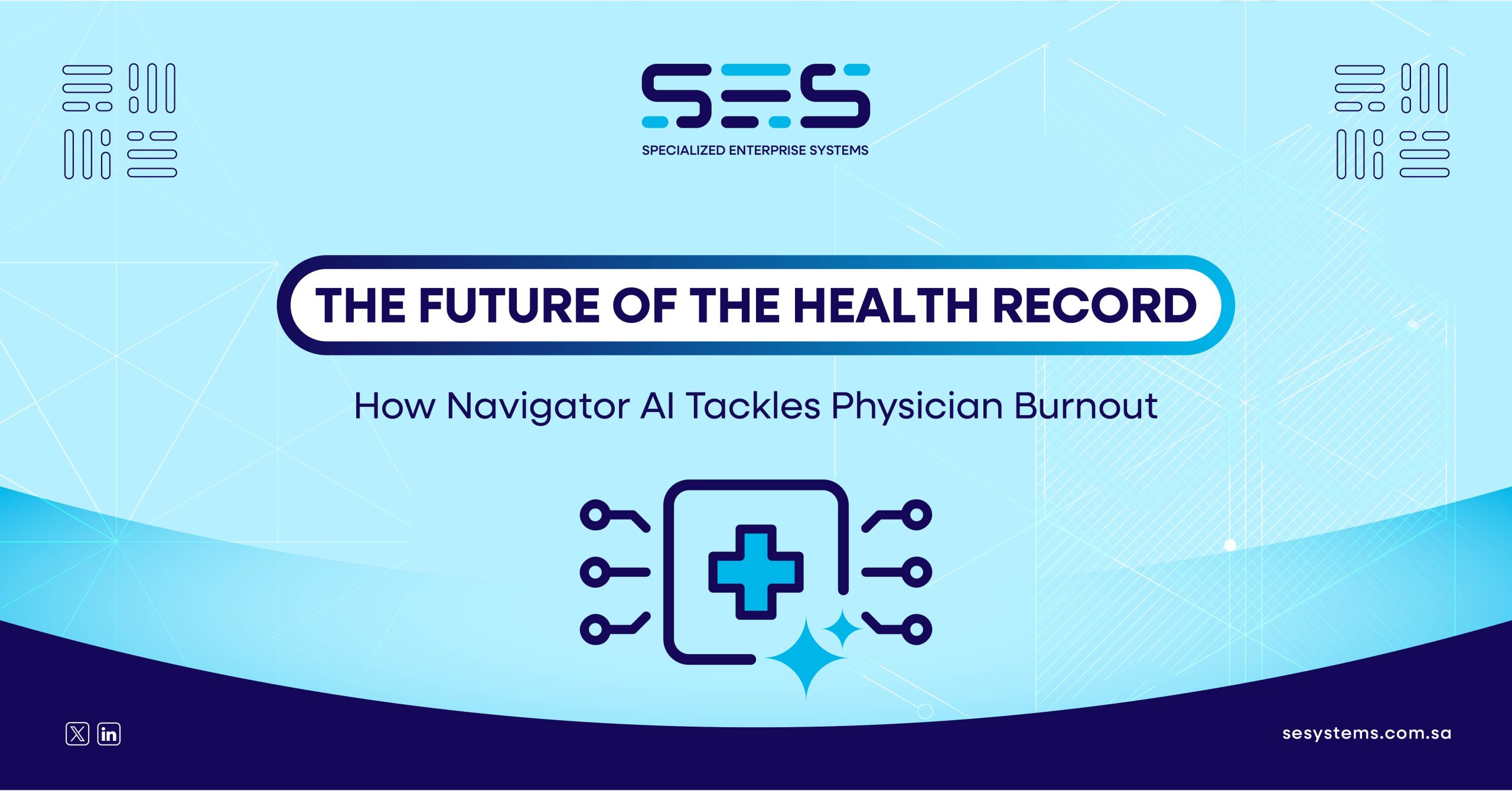A systemic challenge is threatening to overwhelm health systems in the Gulf region and across the world: fragmentation of clinical data.
Over 80% of critical healthcare information is unstructured; just 3% is used effectively. Physicians have to spend an enormous amount of their time searching and updating EHRs — between 3.5 and six hours a day. Much of this time is spent outside of normal working hours.
The outcome is that doctors are exhausted. Administrative work is taking a heavy toll; in Saudi Arabia, 86% of physicians are suffering from burnout. Burnt-out physicians are five times more likely to leave their job — and in the most high-traffic care settings, patient safety may be at risk.
Clinical Intelligence at the Point of Care
Health Records Navigator AI addresses this challenge. Moving beyond traditional search functionality, new generative AI innovations allow providers to query a patient’s entire health record using natural language and receive a contextualized, clinically meaningful response.
A physician could, for example, ask: “has this patient ever shown early signs of heart failure?” Navigator AI provides all the clinical insight the physician needs, by correlating lab reports, analysing test results and interpreting many years of clinical notes. The AI acts as a reasoning engine, automating the administrative work. Research suggests agentic AI systems can reduce cognitive load by up to 52%.
Freeing up Physician Time and Reducing Burnout
The main value of Navigator AI is in interpretation and intelligence. Where legacy EHR platforms return lists of documents and hand-written notes, Navigator AI delivers actionable insight: explaining complex lab results, mapping abnormalities against historical baselines, and distilling entire clinical histories into a concise, auditable summary.
By summarising clinical notes and eliminating manual data hunting, Navigator AI generates immediate provider capacity, mitigates burnout, and accelerates decision-making across high- specialties, preventing diagnostic delays and curbing redundant procedures.
Navigator AI is highly patient-centric, too; patients benefit by engaging with clinicians who arrive prepared with a complete understanding of their history, shifting the consultation focus to treatment decisions. Physicians can spend less consultation time in an EHR and more time talking to the patient themselves.
The impact on physician well-being and efficiency is clear: AI assistance has been shown to reduce the time spent preparing for a complex patient visit by 61% (from 14.1 minutes to 5.5 minutes). Initial deployments of similar AI documentation tools have also led to a 70% reduction in feelings of burnout and fatigue among physicians; clinicians 27% feel more prepared for visits.
And physicians themselves are optimistic about AI in healthcare. A November 2024 American Medical Association study found that a growing majority recognise the benefits of AI in delivering care (68%, up from 63% in 2023).
Clinical Assurance: The Technical Foundation for Safe AI Adoption
For health system CIOs and CMIOs, successful implementation requires a robust technical and compliance foundation. Four core pillars define a system that’s ready for enterprise deployment:
- Interoperability and Data Normalization: The solution must integrate seamlessly with existing EHR and ancillary systems using standards like HL7 FHIR, normalizing disparate lab, imaging, and medication data into a unified, queryable structure.
- Clinical Ontology Alignment: AI reasoning must be anchored to clinical vocabularies (SNOMED CT, LOINC, ICD-10) to eliminate semantic ambiguity, ensuring high accuracy and reliability at the point of care.
- Explainability and Auditability: To build and maintain regulatory and clinical trust, the Navigator AI must be explainable: every output must be traceable back to the specific note, report, or data point that generated it.
- Security and Data Sovereignty: To guarantee PDPL compliance, the deployment model must enforce rigorous patient data sovereignty, increasingly favoring on-premise or private cloud architectures.
The Triple Mandate: Improving Outcomes, Efficiency, and Cost
Beyond technical compliance, the business case for Navigator AI is clear: measurable return on investment across the three critical evaluation metrics for healthcare CFOs.
- Clinical Outcomes Optimization: Rapid, synthesized historical access minimizes missed findings, enabling earlier and more precisely informed interventions, thereby elevating quality metrics and reducing risk.
- Operational Efficiency & Provider Capacity: Streamlining consultations reduces provider friction, boosts institutional throughput, and directly combats clinician burnout, maximizing effective provider hours.
- Economic Value & Cost Containment: Simplified access to prior testing and results sharply reduces unnecessary labs and imaging expenditures, curtailing avoidable systemic cost.
By mobilizing hidden, unstructured data and placing actionable intelligence directly in the clinical workflow, Navigator AI delivers the three goals health leaders need to see: improved care, delivered more efficiently, at a lower systemic cost.
And for the many thousands of Saudi physicians who will again leave work exhausted tonight, Navigator AI gives back precious hours each day for practice and personal life — tackling burnout, reducing turnover and improving patient outcomes. SES can help you get there. Contact us to find out more.










